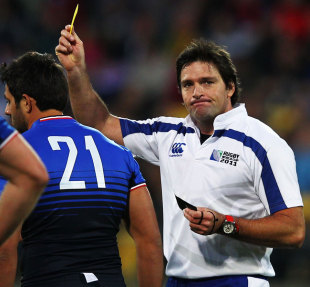|
Comment
The prevention and the cure
Rowly Williams, TheRefZone.co.uk
February 25, 2012

Steve Walsh will take charge of England v Wales
© Getty Images
Enlarge
Entering into this weekend's round of Six Nations matches there are several things that both players and referees will be very aware of. Firstly, the highlighted incidents of 'tip tackles' (or off the ball foul play in Bradley Davies' case) will have all players and officials on red alert, dreadful pun aside. Secondly, there is the knowledge of how penalties have had an effect on the outcome of the matches. So expect extended phase play as teams defend as intensely as possible without straying into the penalty zone. Finally, yellow cards will be issued for professional (technical) fouls, repeated team offences or individual incidents that referees deem deliberately negative, especially in the respective 22 areas. With that in mind, we should see some excellent open rugby. Just to highlight this point, TheRefZone attended a Q&A evening with Wayne Barnes and Steve Walsh on Thursday hosted by the London Society of Referees. Among a series of open and honest exchanges, both of the guests revealed that part of their match preparation was based on identifying where they could prevent penalties having to be awarded rather than looking for things they could penalise. It might surprise some of you that referees look for prevention, not the cure, but this is borne out by their stats of penalty awards. Both penalise where necessary. Indeed, Wayne Barnes' count in the Ireland v Wales match was only 15, six below the Six Nations average. Steve Walsh's game - England v Wales - will see him dealing with two teams who have had contrasting results at the breakdown. England have conceded 13.5 turnovers to Wales' 9.5, and additionally have taken an average of a little over 4 seconds to clear ball, compared to Wales, who have averaged only 2.5 seconds. Either England employ a Meerkat at scrum-half, who likes to look up before moving the ball, or there are issues about teams slowing down their ball or themselves presenting it cleanly. There may well be issues at the breakdown where one team seemingly looks to play the ball fast and away, against a team that maybe also want to, but on current evidence can't. How the teams manage this area and what they do or don't do, will be key to what the referee has to do next. Barnes manages two teams who have amassed 35 turnovers between them, with France leading the way with 20. Mindful that they've only played the one match, this suggests a pretty loose match up at Murrayfield. As a quick footnote, Scotland are at 999 points in matches against France, not sure what the of odds would be remaining on that come the end of play Sunday, but then India's Sachin Tendulkar should have got his hundredth century by now too. Craig Joubert referees Ireland's second (not by design) home match of the tournament, which sees the home side with average turnovers conceded of 10. That's comfortably fewer than Italy's 19 and bodes well for them in this area. Italy also go into this match with the lowest tackle success rate of only 88%, only! Briefly returning to the point about time, the breakdown speed is not the only thing that referees need to be aware off. I just want to make the point about the speed of incidents during matches. As an example, when Steven Ferris was (correctly) penalised in the match against Wales, the match clock read 78.52 at the start of the tackle and 78.53 at the end of it. Even allowing for a little slippage, let's say 78.53.5, the referee had one to one and a half seconds to assess the situation prior to making a decision. Such is the speed of the modern International game and such are the pressures on players and referees alike to try and get it right. Perhaps we should bear that in mind when the referees make that 'split second call', because you know what? It very nearly always is… © ESPN Sports Media Ltd. TheRefZone.co.uk - Referee training and development
|
Live Sports
Communication error please reload the page.
-
Football
-
Cricket
-
Rugby
-
- Days
- Hrs
- Mins
- Secs
F1 - Abu Dhabi GP
Abu Dhabi Grand Prix December 11-131. Max Verstappen ()
2. Valtteri Bottas (Mercedes)
3. Lewis Hamilton (Mercedes)
4. Alexander Albon ()
5. Lando Norris ()
6. Carlos Sainz Jr ()
-
ESPNOtherLive >>
Snooker - China Open
Tennis - Miami Open

